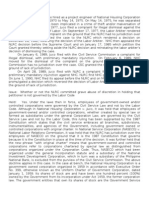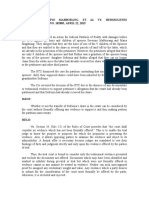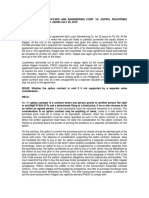Professional Documents
Culture Documents
De Jesus Vs COA
De Jesus Vs COA
Uploaded by
MacOriginal Description:
Original Title
Copyright
Available Formats
Share this document
Did you find this document useful?
Is this content inappropriate?
Report this DocumentCopyright:
Available Formats
De Jesus Vs COA
De Jesus Vs COA
Uploaded by
MacCopyright:
Available Formats
DE JESUS V. COMMISSION ON AUDIT, G.R. NO. 109023, AUGUST 12, 1998.
FACTS
:Petitioners are employees of the Local Water Utilities Administration (LWUA). On July 1, 1989,Republic
Act No. 6758 "An Act Prescribing A Revised Compensation and Position ClassificationSystem in the
Government and For Other Purposes", took effect. Section 12 of said lawprovides for the consolidation of
allowances and additional compensation into standardizedsalary rates. Certain additional compensations,
however, were exempted from consolidation.Prior to this, they were receiving honoraria as designated
members of the LWUA BoardSecretariat and the Pre-Qualification, Bids and Awards Committee. To
implement RA 6758,the Department of Budget and Management (DBM) issued Corporate Compensation
Circular No. 10 (DBM-CCC No. 10), discontinuing without qualification effective November 1, 1989,
allallowances and fringe benefits granted on top of basic salary.Pursuant to said Circular, respondent
Leonardo Jamoralin, as corporate auditor, disallowed onpost audit, the payment of honoraria to the herein
petitioners. Petitioners appealed to theCOA, questioning the validity and enforceability of DBM-CCC No.
10. They contend that theCircular is inconsistent with the provisions of Rep. Act 6758 (the law it is
supposed toimplement) and, therefore, void. And it is without force and effect because it was notpublished
in the Official Gazette.COA upheld the validity and effectivity of DBM-CCC No. 10. Petitioners elevated
the case tothe Supreme Court. The Solicitor General supported the petitioners, saying that Sec. 5.6 of
DBM-CCC No. 10 is anullity for being inconsistent with and repugnant to the very law it is intended to
implement. The DBM Secretary asserted that the honoraria in question are considered included in thebasic
salary, for the reason that they are not listed as exceptions under Sec. 12 of Rep. Act6758.
ISSUE: Whether or not DBM-CCC No. 10 has legal force or effect despite its lack of publication in the
Official Gazette
RULING:
No. Following the doctrine enunciated in Tanada v. Tuvera (146 SCRA 446), publication in the Official
Gazette or in a newspaper of general circulation in the Philippines is required since DBM-CCC No. 10 is in
the nature of an administrative circular the purpose of which is to enforce or implement an existing law.
Stated differently, to be effective and enforceable, DBM-CCC No. 10 must go through the requisite
publication in the Official Gazette or in a newspaper of general circulation in the Philippines. It is clear that
DBM-CCC No. 10 is not a mere interpretative or internal regulation. Before the said circular under attack
may be permitted to substantially reduce their income, the government officials and employees concerned
should be apprised and alerted by the publication of subject circular in the Official Gazette or in a
newspaper of general circulation in the Philippines — to the end that they be given amplest opportunity to
voice out whatever opposition they may have, and to ventilate their stance on the matter. This approach is
more in keeping with democratic precepts and rudiments of fairness and transparency. The ineffectiveness
of the Circular makes resolution of the other issues at bar unnecessary. Petition is granted.
You might also like
- Digest - Ople V Torres, 293 SCRA 141Document2 pagesDigest - Ople V Torres, 293 SCRA 141Vic Rabaya88% (8)
- Digest of Philippine Association of Service Exporters, Inc. v. Torres (G.R. No. 101279)Document2 pagesDigest of Philippine Association of Service Exporters, Inc. v. Torres (G.R. No. 101279)Rafael Pangilinan83% (12)
- San Miguel Corporation Vs MaercDocument1 pageSan Miguel Corporation Vs MaercMacNo ratings yet
- Case 2 Republic vs. Express TelecommunicationsDocument2 pagesCase 2 Republic vs. Express TelecommunicationsJanlucifer Rahl100% (3)
- Case Digest - People Vs Maceren 79 SCRA 450, G.R. No. L-32166, October 18, 1977Document1 pageCase Digest - People Vs Maceren 79 SCRA 450, G.R. No. L-32166, October 18, 1977Lu CasNo ratings yet
- Case Digest - Peralta vs. Civil Service Commission 212 SCRA 425, G.R. No. 95832, Aug. 10, 1992Document2 pagesCase Digest - Peralta vs. Civil Service Commission 212 SCRA 425, G.R. No. 95832, Aug. 10, 1992Lu Cas100% (3)
- SMART COMMUNICATIONS, INC. ET AL. v. NTC - DigestDocument2 pagesSMART COMMUNICATIONS, INC. ET AL. v. NTC - DigestMark Genesis Rojas100% (1)
- People Vs MacerenDocument12 pagesPeople Vs MacerenNarciso Javelosa III75% (4)
- Statcon NotesDocument35 pagesStatcon NotesAliNo ratings yet
- Lapid Vs CADocument2 pagesLapid Vs CAmepo100% (1)
- Case #11Document2 pagesCase #11Almira100% (2)
- PITC V COADocument3 pagesPITC V COAGem Li100% (1)
- Manila Hotel Vs NLRCDocument1 pageManila Hotel Vs NLRCMacNo ratings yet
- Ledesma Vs MclachlinDocument2 pagesLedesma Vs MclachlinMac100% (4)
- BR Unit 1 Notes PDFDocument63 pagesBR Unit 1 Notes PDFUdaya Raja100% (3)
- SR Bommai and Ors Vs Union of India UOI and Ors 111021s940105COM314203Document15 pagesSR Bommai and Ors Vs Union of India UOI and Ors 111021s940105COM314203Kirithika HariharanNo ratings yet
- Case DIgest - Rodolfo S. de Jesus Vs Commission On Audit GR 109023 Aug. 12 1998Document1 pageCase DIgest - Rodolfo S. de Jesus Vs Commission On Audit GR 109023 Aug. 12 1998Lu CasNo ratings yet
- Romulo, Mabanta, Buenaventura, Sayoc & de Los Angeles vs. Home Development Mutual FundDocument1 pageRomulo, Mabanta, Buenaventura, Sayoc & de Los Angeles vs. Home Development Mutual FundJ.G R0% (1)
- De Jesus Vs COA - DigestDocument2 pagesDe Jesus Vs COA - Digestlengjavier100% (1)
- LUZON DEVELOPMENT BANK vs. ALDBEDocument1 pageLUZON DEVELOPMENT BANK vs. ALDBEEi Ar TaradjiNo ratings yet
- BUKLOD NG KAWANING EIIB V ZAMORA - 2001 - DigestDocument1 pageBUKLOD NG KAWANING EIIB V ZAMORA - 2001 - DigestKate Garo0% (1)
- Public Schools District Supervisors Associate Vs de Jesus, GR No. 157299, June 19, 2006Document1 pagePublic Schools District Supervisors Associate Vs de Jesus, GR No. 157299, June 19, 2006geni_pearlc50% (2)
- Juco v. NLRCDocument2 pagesJuco v. NLRCRaymond Roque100% (4)
- Festejo VDocument4 pagesFestejo VAbegail De LeonNo ratings yet
- Edited Shell Phil Vs Central Bank and Ibaaeu Vs InciongDocument4 pagesEdited Shell Phil Vs Central Bank and Ibaaeu Vs InciongJun MontanezNo ratings yet
- Bito-Onon v. Fernandez (G.R. No. 139813. January 31, 2001.)Document1 pageBito-Onon v. Fernandez (G.R. No. 139813. January 31, 2001.)Emmanuel YrreverreNo ratings yet
- LPB-v-CADocument1 pageLPB-v-CAErik CelinoNo ratings yet
- Cebu Oxygen Acetylene Co., vs. Drilon, G.R. No. 82849Document1 pageCebu Oxygen Acetylene Co., vs. Drilon, G.R. No. 82849Bug Rancher100% (1)
- Eastern Shipping Lines vs. POEA, 166 SCRA 533Document1 pageEastern Shipping Lines vs. POEA, 166 SCRA 533Bug Rancher100% (1)
- Case Digest Template - DENR VS ABADDocument1 pageCase Digest Template - DENR VS ABADJeston ErrolNo ratings yet
- Feliciano Vs GisonDocument2 pagesFeliciano Vs GisonPaolo MendioroNo ratings yet
- G.R. No. L-16704Document1 pageG.R. No. L-16704Vijanes BeltransNo ratings yet
- Mayor Vs MacaraigDocument2 pagesMayor Vs MacaraigCass ParkNo ratings yet
- Landbank Vs AranetaDocument2 pagesLandbank Vs AranetaRenNo ratings yet
- Jaworski Vs Pagcor DigestDocument1 pageJaworski Vs Pagcor DigestAnonymous oDPxEkd100% (1)
- Romulo Mabanta Vs HDMF, GR No. 131082, June 19, 2000Document1 pageRomulo Mabanta Vs HDMF, GR No. 131082, June 19, 2000geni_pearlcNo ratings yet
- Villegas vs. Subido DigestDocument2 pagesVillegas vs. Subido DigestAndrea Peñas-ReyesNo ratings yet
- Agra vs. CoadocxDocument2 pagesAgra vs. CoadocxDane Pauline Adora100% (1)
- Admin Law CD 03182022Document15 pagesAdmin Law CD 03182022Majorie Arimado100% (1)
- Admin Law Case DigestsDocument5 pagesAdmin Law Case Digestsanna bee100% (2)
- Larin v. Executive Secretary FactsDocument3 pagesLarin v. Executive Secretary FactssiyaonNo ratings yet
- Eugenio vs. CSC (1995) 243 SCRA 196: FactsDocument1 pageEugenio vs. CSC (1995) 243 SCRA 196: FactsNivra Lyn EmpialesNo ratings yet
- 8th Case BernabeDocument2 pages8th Case BernabeJoshua Paril100% (1)
- Sterling Digested CasesDocument2 pagesSterling Digested CasesMarvin H. Taleon IINo ratings yet
- David Vs ComelecDocument4 pagesDavid Vs ComelecRaymond RoqueNo ratings yet
- Shioji v. HarveyDocument2 pagesShioji v. HarveyJazz TraceyNo ratings yet
- Heirs of Santiago Pastoral Vs The SecretaryDocument2 pagesHeirs of Santiago Pastoral Vs The SecretaryCzar Ian AgbayaniNo ratings yet
- State Immunity Chap 3-7-19-16Document71 pagesState Immunity Chap 3-7-19-16Jassy BustamanteNo ratings yet
- People v. Que Po Lay DigestDocument2 pagesPeople v. Que Po Lay DigestkathrynmaydevezaNo ratings yet
- Casino Labor Association Vs Court of AppealsDocument1 pageCasino Labor Association Vs Court of AppealsshezeharadeyahoocomNo ratings yet
- RULE 138 Attorneys and Admission To BarDocument6 pagesRULE 138 Attorneys and Admission To BarSu Kings AbetoNo ratings yet
- Directory Written ReportDocument4 pagesDirectory Written Reportavocado booksNo ratings yet
- I-13 Manila Herald Publishing V RamosDocument1 pageI-13 Manila Herald Publishing V RamosG SNo ratings yet
- De Los Reyes V SandiganbayanDocument2 pagesDe Los Reyes V SandiganbayanTippy Dos SantosNo ratings yet
- Encinas Vs AgustinDocument2 pagesEncinas Vs AgustinHudson CeeNo ratings yet
- Victorias Milling V SSCDocument2 pagesVictorias Milling V SSCAndrea Juarez100% (1)
- Garcia and Dumago v. Philippine Airlines (G.r. No. 164856)Document3 pagesGarcia and Dumago v. Philippine Airlines (G.r. No. 164856)MhaliNo ratings yet
- Montes V Civil Service BoardDocument1 pageMontes V Civil Service Boardjolly verbatimNo ratings yet
- Asian Transmission Corporation vs. Court of AppealsDocument2 pagesAsian Transmission Corporation vs. Court of AppealsXryn MortelNo ratings yet
- StatCon Case Digests Finals Week 2Document10 pagesStatCon Case Digests Finals Week 2Jeraldine Mae RaotraotNo ratings yet
- CASE No. 57 Chevron Philippines Inc. (Formerly Known As Caltex Philippines Inc.) vs. Leo Z. MendozaDocument2 pagesCASE No. 57 Chevron Philippines Inc. (Formerly Known As Caltex Philippines Inc.) vs. Leo Z. MendozaJonel L. SembranaNo ratings yet
- 30 B.F. Goodrich Philippines, Inc. v. Workmen's Compensation Commission, G.R. No. L-38569, 29 March 1988Document2 pages30 B.F. Goodrich Philippines, Inc. v. Workmen's Compensation Commission, G.R. No. L-38569, 29 March 1988loschudent0% (1)
- PCGG Vs PeñaDocument2 pagesPCGG Vs PeñaTaper Garcia100% (1)
- PERSONS - Nat - L Amnesty Commisiio vs. COA GR. 156982Document2 pagesPERSONS - Nat - L Amnesty Commisiio vs. COA GR. 156982Evangelyn EgusquizaNo ratings yet
- Petitioners Vs Vs Respondents The Government Corporate Counsel For Petitioners. The Solicitor General For RespondentsDocument6 pagesPetitioners Vs Vs Respondents The Government Corporate Counsel For Petitioners. The Solicitor General For RespondentsChristine VillanuevaNo ratings yet
- BANK OF AMERICA VS. CA G.R. NO. 120135 MAR 31, 2003 FactsDocument53 pagesBANK OF AMERICA VS. CA G.R. NO. 120135 MAR 31, 2003 FactsMacNo ratings yet
- People Vs Libnao, 395 Scra 407 FactsDocument2 pagesPeople Vs Libnao, 395 Scra 407 FactsMacNo ratings yet
- SAN MIGUEL CORPORATION EMPLOYEES UNION-PTGWO vs. HON. MA. NIEVES D. CONFESORDocument3 pagesSAN MIGUEL CORPORATION EMPLOYEES UNION-PTGWO vs. HON. MA. NIEVES D. CONFESORMacNo ratings yet
- Tan Vs Republic, 573 Scra 89 FactsDocument2 pagesTan Vs Republic, 573 Scra 89 FactsMacNo ratings yet
- SCL CasesDocument5 pagesSCL CasesMacNo ratings yet
- Ong Vs Court of Appeals, 301 Scra 387 FactsDocument2 pagesOng Vs Court of Appeals, 301 Scra 387 FactsMac100% (2)
- Q & A Conflict of LawsDocument3 pagesQ & A Conflict of LawsMacNo ratings yet
- MABBORANG V MABBORANGDocument2 pagesMABBORANG V MABBORANGMac100% (1)
- Ureta Vs UretaDocument3 pagesUreta Vs UretaMacNo ratings yet
- Background of The Case: DecisionDocument5 pagesBackground of The Case: DecisionMacNo ratings yet
- Manila Electric Company vs. Rogelio Benamira, Et AlDocument4 pagesManila Electric Company vs. Rogelio Benamira, Et AlMacNo ratings yet
- Austria Vs CFI RizalDocument2 pagesAustria Vs CFI RizalMacNo ratings yet
- UERMMMC Vs LaguesmaDocument1 pageUERMMMC Vs LaguesmaMacNo ratings yet
- Dy Peh, And/Or Victory Rubber Manufacturing, Petitioner, vs. Collector of Internal Revenue, RespondentDocument3 pagesDy Peh, And/Or Victory Rubber Manufacturing, Petitioner, vs. Collector of Internal Revenue, RespondentMacNo ratings yet
- PNOC Vs KeppelDocument2 pagesPNOC Vs KeppelMacNo ratings yet
- Tan Vs LagramaDocument2 pagesTan Vs LagramaMacNo ratings yet
- Santos Vs LumbaoDocument2 pagesSantos Vs LumbaoMacNo ratings yet
- Manila Water Co Vs PenaDocument1 pageManila Water Co Vs PenaMacNo ratings yet
- Conde Vs AbayaDocument2 pagesConde Vs AbayaMac100% (1)
- LVN Pictures Vs FFWDocument2 pagesLVN Pictures Vs FFWMacNo ratings yet
- DY PEH V CIR 2Document1 pageDY PEH V CIR 2MacNo ratings yet
- Canlubang Security Agency Corporation V NLRCDocument1 pageCanlubang Security Agency Corporation V NLRCMacNo ratings yet
- In The Matter of The Probation of The Will of Jose RiosaDocument3 pagesIn The Matter of The Probation of The Will of Jose RiosaMacNo ratings yet
- Hemady Vs Luzon SuretyDocument2 pagesHemady Vs Luzon SuretyMacNo ratings yet
- Neri Vs AkutinDocument2 pagesNeri Vs AkutinMacNo ratings yet
- JO Vs NLRCDocument1 pageJO Vs NLRCMacNo ratings yet
- Siasat Vs IacDocument1 pageSiasat Vs IacMacNo ratings yet
- Date - 13 Nov. 2015: TH RDDocument3 pagesDate - 13 Nov. 2015: TH RDDhiraj T BhalaviNo ratings yet
- R. A. 9266 Mastersclass SDocument2 pagesR. A. 9266 Mastersclass SMei-Ann Cayabyab-PatanoNo ratings yet
- Mangoma Vs Macadaeg - G.R. No. L-5153. December 10, 1951Document3 pagesMangoma Vs Macadaeg - G.R. No. L-5153. December 10, 1951Ebbe DyNo ratings yet
- Kerala Feeds Limited ApplicationDocument4 pagesKerala Feeds Limited ApplicationNavaneeth UnnikrishnanNo ratings yet
- People Vs SalcedoDocument17 pagesPeople Vs SalcedoGio AvilaNo ratings yet
- Remedial 80 GRNo198241Document2 pagesRemedial 80 GRNo198241Ailish Zoe EstrailaNo ratings yet
- Consideration PQ Solving (C.L)Document9 pagesConsideration PQ Solving (C.L)Mahdi Bin MamunNo ratings yet
- Del Prado V CaballeroDocument4 pagesDel Prado V CaballerochiiwaaaaaaaNo ratings yet
- Citizenship in The PhilippinesDocument5 pagesCitizenship in The PhilippinesRy FernandezNo ratings yet
- Banco de Brasil vs. CADocument3 pagesBanco de Brasil vs. CADana HernandezNo ratings yet
- In-N-OUT Burger Vs SehwaniDocument12 pagesIn-N-OUT Burger Vs SehwaniJheiy-em EvangelistaNo ratings yet
- 8 Years DigestDocument1,288 pages8 Years DigestSameer SachdevaNo ratings yet
- Maharashtra Welfare Officer Rules 1966Document7 pagesMaharashtra Welfare Officer Rules 1966Vaiby Cool83% (6)
- Reviewer Quiz 3 - POLICIESDocument2 pagesReviewer Quiz 3 - POLICIESMelannie ArgenteraNo ratings yet
- BPI Vs CaDocument2 pagesBPI Vs Cagianfranco0613No ratings yet
- Guadalquiver v. Sea Power ShippingDocument3 pagesGuadalquiver v. Sea Power ShippingMarilyn MalaluanNo ratings yet
- Christina Grant LawsuitDocument5 pagesChristina Grant LawsuitSoojiNo ratings yet
- Ramones vs. Spouses GuimocDocument10 pagesRamones vs. Spouses GuimocEmir MendozaNo ratings yet
- Key Managerial Personnel - Series-33Document13 pagesKey Managerial Personnel - Series-33Divesh GoyalNo ratings yet
- 59 - Buklod NG Magbubukid Sa Lupaing Ramos v. E.M. Ramos & SonsDocument6 pages59 - Buklod NG Magbubukid Sa Lupaing Ramos v. E.M. Ramos & SonsApay Grajo100% (2)
- Challenges in Implementing HisbahDocument3 pagesChallenges in Implementing Hisbahbromar975No ratings yet
- Indian Evidence Act - PresumptionDocument2 pagesIndian Evidence Act - PresumptionamitrupaniNo ratings yet
- Constitutional Governance - II: ObjectivesDocument4 pagesConstitutional Governance - II: ObjectivesApoorvaChandraNo ratings yet
- ARTICLE 1487 EXPENSES FOR EXECUTION AND REGISTRATION Only Tells About That The Vendor Has The Duty ToDocument5 pagesARTICLE 1487 EXPENSES FOR EXECUTION AND REGISTRATION Only Tells About That The Vendor Has The Duty Toereca vilogNo ratings yet
- Chapter 1 Plato V AristotleDocument15 pagesChapter 1 Plato V AristotleMuhammad Umair AfzalNo ratings yet
- Glossary Legal EnglishDocument11 pagesGlossary Legal EnglishValeriaNo ratings yet
- Salazar, Written Sec 4-6Document5 pagesSalazar, Written Sec 4-6Justin SalazarNo ratings yet
- Shreha, Hiranmayi, Shelika (BA LLB III)Document20 pagesShreha, Hiranmayi, Shelika (BA LLB III)Shreha VlogsNo ratings yet























































































































